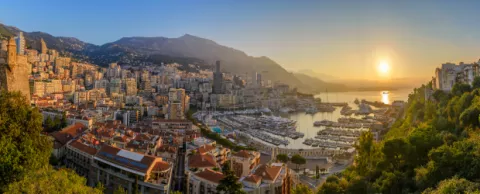
The principality of Monaco is the second smallest and most densely populated country in the world, with 36,000 residents living in the 2-square-kilometre city-state. Despite its small size—or perhaps because of it—Monaco is faced with similar environmental challenges as many other cities across Europe. Over the past 150 years, Monaco has looked for smart solutions to combat ecological and environmental issues, becoming one of the first countries to turn to reforestation as a way to preserve its signature surrounding mountains. Now the principality is looking to pioneer forward in terms of sustainability and environmental preservation. From seawater heat pumps to electric bike sharing schemes, here are five of the ways Monaco is proving that a principality has plenty of power when it comes to creating dynamic sustainable development.
Enticing urban transport
Keeping city bus tickets at a reasonable cost of 2€ has led to a 20 percent increase of bus passengers in the principality. Monaco has also upped the frequency of its public transport and night bus services, which serve 142 stops and can be tracked in real time thanks to next-generation data displays on buses and bus stations. During morning and evening rush hour, TER (regional express trains) run every 15 minutes, offering a convenient and quick means of transport for the 38,000 French and Italian employees who work in the principality.
Renewable energy plans
By 2020, Monaco aims to reduce greenhouse gas emissions by 20 percent from its 1990 figures, as well as reduce energy consumption and produce 20 percent of energy from renewable resources. Seawater heat pumps have already helped produce 17 percent of the principality’s energy, saving 15,000 tons of petroleum per year.
E-bikes & cars
In terms of transport, the principality already offers plenty of incentives to limit CO2 emissions, such as a self-service electric bike scheme with 105 bikes at 17 locations and a car-sharing service called Mobee, with 25 electric vehicles that can be booked and tracked with an app. As part of its commitment to clean or low-pollution vehicles, Monaco offers electric or hybrid vehicles a 15€ per month car park reduction, as well designated street parking and free access to over 574 charging points in public car parks.
Streamlined waste collection
Vehicles, underground bins and a vacuum collection system ensure that the principality’s waste is efficiently collected and incinerated, with a plant in the newer Fontvieille district that recovers energy from waste that is later used to help with heat, electricity and cooling.
Air quality mapping
Monaco has installed 52 sensors as part of a high-resolution air quality mapping programme, which will measure pollutants over a period of one month in winter and one month in summer to see how heavily impacted the principality is by automobile pollution and fuel oil combustion.
By putting incentive programmes in place and looking to innovative and attractive urban transport plans and infrastructure, the Prince’s Government is working with the constraints of a compact territory—as well as with its citizens—to reach its energy consumption goals and offer a green example for other cities to follow.



